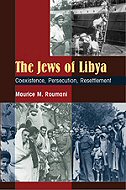|
The Jews of Libya: Coexistence, Persecution, Resettlement
|
|
Maurice M. Roumani
|

|

This book examines the transformative period in the history of the Jews of Libya (1938–67), a period crucial to understanding Libyan Jewry’s evolution into a community playing significant roles in Israel, Italy and in relation with Qaddhafi’s Libya.
Against a background of a reform conscious Ottoman administration (1835–1911) and subsequent stirrings of modernization under Italian colonial influence (1911-43), the Jews of Libya began to experience rapid change following the application of fascist racial laws of 1938, the internment of Libyan Jews in concentration camps, the onset of war-related calamities and violent expressions of Libyan pan-Arabism, culminating in mass migration to Israel in the period 1949–52 and subsequently in Italy in 1967.
By focusing on key socio-economic and political dimensions of this process, the author reveals the ability of Libyan Jewry to adapt to and integrate into new environments without losing its unique and historical traditions.
Maurice M. Roumani, born in Benghazi, Libya, is Associate Professor of Political Science and the Middle East of Ben-Gurion University of the Negev in Israel where he is also the founder and Director of the J.R. Elyachar Center for the Study of the Sephardi Heritage. A graduate of Brandeis University, the University of Chicago and the University of London, he has held teaching and research positions of universities in the United States, Israel and Italy. Among his publications are: Forces of Change in the Middle East (ed.); The Case of Jews from Arab Countries: A Neglected Issue; From Immigrant to Citizen: The Contribution of the Army to National Integration in Israel; and Zionism and Social Change in Libya of the Turn of the Century.
|
|
